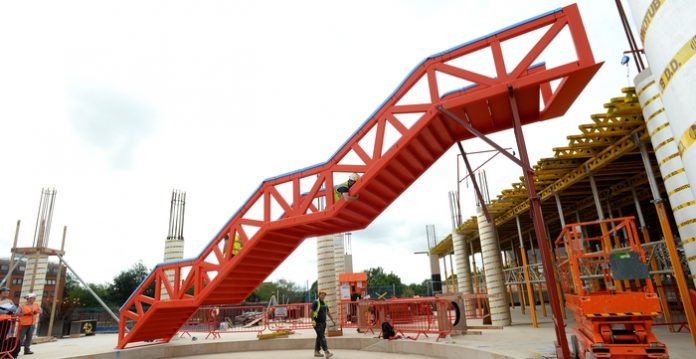An Oculus staircase, the first of its kind in the UK, is being installed at Cardiff University’s cutting-edge Innovation Campus.
Bouygues UK, the construction company building Innovation Campus, is working with Taunton Fabrications to design and install the staircase, which is a sculptural, open staircase travelling through a slanting void. Its name is taken from the oculus design, which depicts an eye that allows light to flood into a space.
Designed by architects Hawkins\Brown, the aim of the Oculus staircase is to drive engagement and collaboration between the varying departments and uses of the building. It starts at the ground floor as a social stair and forms breakout zones to each level, which are curated differently, becoming destinations to users on other floors. These can also be accessed by the lift core adjacent.
The Oculus staircase is set to be the showpiece of Innovation Central and its fitting is a major milestone in the project. Bouygues UK and Cardiff University are transforming a former disused rail yard into a state-of-the-art campus for social science-led research, high-tech job creation and student start-ups, and further expertise in compound semi-conductors.
The Innovation Central building will be the world’s first social science research park, co-locating leading researchers, practitioners and policy makers.
Justin Moore, Operations Director for Bouygues UK in Wales, and project lead on Cardiff Innovation Campus, said: “We are over the moon to be bring the UK’s first Oculus staircase to Cardiff. What’s so interesting about this building is that its layout is designed by activity rather than department – a venue like this requires very different environments, from quiet spaces for the secure data facility to a buzzing ground floor.
“The Oculus is central to this as there are more private, secure spaces further away from the staircase and then open plan / breakout zones hugging it. It’s a fantastic, eye-grabbing design and we can’t wait to see the finished staircase in all of its glory.”
Justin added: “‘The principle of the oculus staircase makes it difficult to install as the stairs are not installed directly above each other, as it is for a standard staircase, but offset at each floor level. Several methods of installation have been reviewed over months to come up with the best way to safely and practically install the stairs.
“Initially, each stair was going to be installed after all the concrete floors were constructed by using spider cranes, but this meant that much of the floor area around the stair would be covered in propping delaying the internal finishing.
“Bouygues UK came up with a solution to install each stair after each floor slab was constructed and then construct the next floor above the stair with a cleaver configuration of temporary works designed by the stair contractor, Taunton Fabrications and the RC frame Contractor, 4D Structures. This is repeated on every floor. It is a complex and exciting construction project.”
Professor Damian Walford Davies, Pro Vice-Chancellor, College of Arts, Humanities and Social Sciences, said: “The oculus staircase embodies in practical, material form the values and ethos of the Innovation Central building: it’s a dynamic connecting path, with – as the name suggests – an eye open to the outside world.”



















